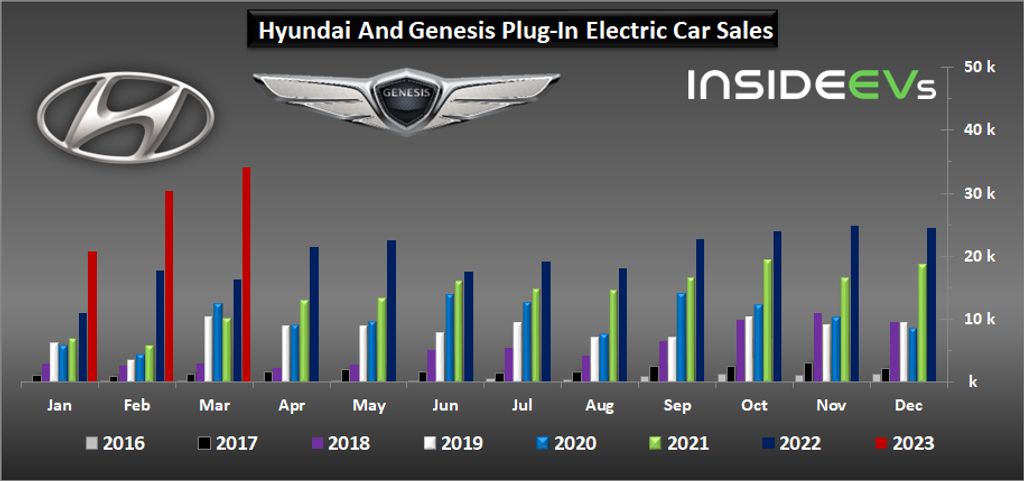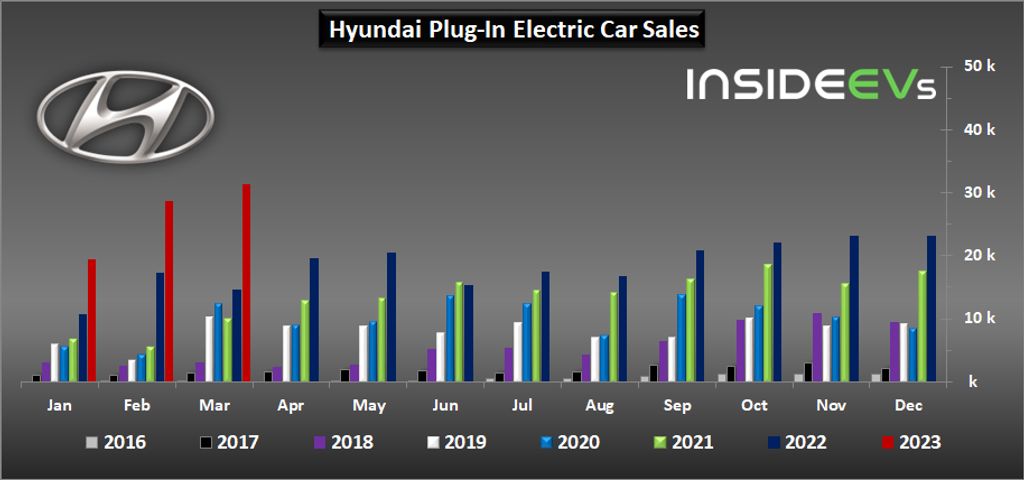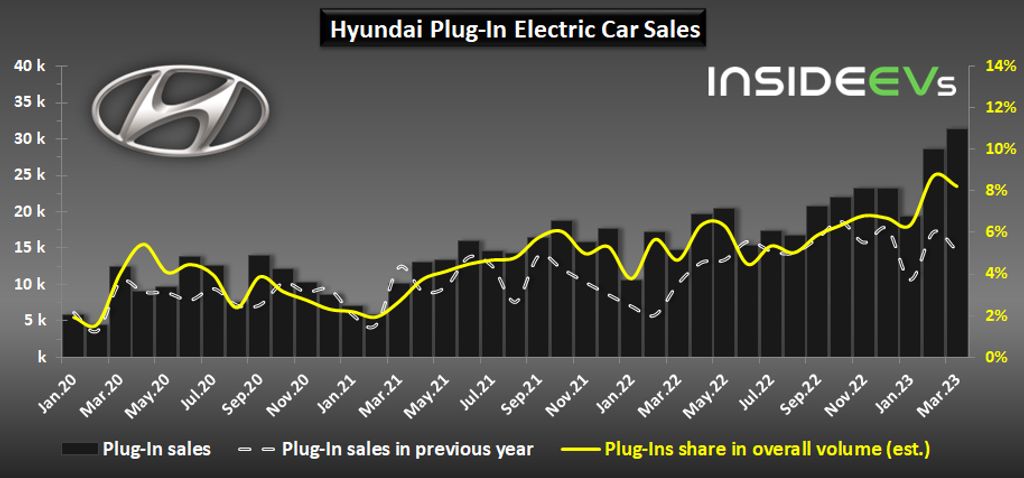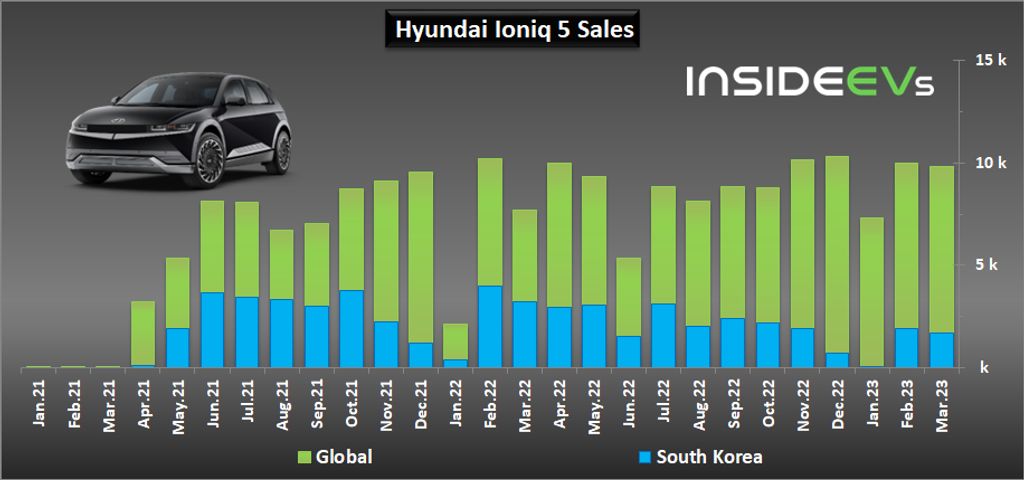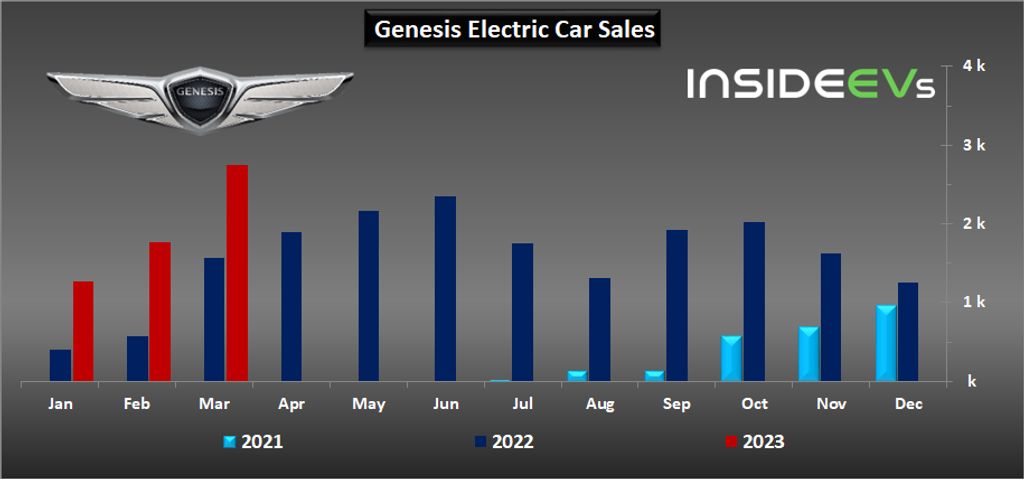Hyundai Motor Company (Hyundai and Genesis brands) reports that its global vehicle sales in March amounted to 381,885 units, which is 21 percent more than a year ago. During the first quarter of 2023, the company sold slightly over 1 million vehicles (up 13 percent year-over-year).
However, the most important thing is how fast the group is increasing plug-in electric car sales.
According to Hyundai Motor Company, last month, the combined wholesale shipments (closely related to production) of Hyundai and Genesis plug-in cars amounted to *34,125 (up 110 percent year-over-year). We estimate that it’s around nine percent of the total volume.
*Retail sales in South Korea plus wholesale sales (manufacturer level) outside South Korea, unaudited and on a preliminary basis.
**The Hyundai sales report includes sales numbers from the plants in South Korea, Europe (Kona Electric and Tucson PHEV), Indonesia (Ioniq 5), and plants in China and India (both small numbers), as well as in the United States.
The data indicates that both all-electric and plug-in hybrid vehicle wholesale shipments reached monthly records. In the case of BEVs, it’s more than 28,600 for the very first time, while in the case of PHEVs, it’s more than 5,400 units.
The company itself reports more than 24,000 all-electric vehicle sales (compared to 28,000+ wholesale shipments).
“Hyundai Motor maintained its electric vehicle (EV) sales momentum by selling over 24,000 units in March, led by IONIQ 5 and IONIQ 6, which accounted for more than half of the total EV sales.”
Wholesale shipments volume by powertrain type:
- BEVs: 28,680 (up 120%)
- PHEVs: 5,445 (up 68%)
- Total plug-ins: 34,125 (up 110%)
- FCVs: 723 (up 62%)
So far this year, the wholesale shipments exceeded 85,000 (up 89 percent year-over-year).
Wholesale shipments volume by powertrain type year-to-date:
- BEVs: 71,958 (up 111%)
- PHEVs: 13,249 (up 21%)
- Total plug-ins: 85,207 (up 89%)
- FCVs: 2,051 (up 40%)
For reference, in 2022 Hyundai Motor Company sold more than 240,000 plug-in electric cars (up 45 percent year-over-year), including nearly 195,000 all-electric (up 56 percent).
Hyundai brand
The Hyundai brand, which is responsible for the majority of the company’s plug-in car sales, noted a 114 percent year-over-year increase in plug-in car wholesale shipments, to over 31,000. All results are a record high.
Hyundai wholesale shipments volume by powertrain type:
- BEVs: 25,930 (up 127%)
- PHEVs: 5,445 (up 68%)
- Total plug-ins: 31,375 (up 114%)
- FCVs: 723 (up 62%)
Wholesale shipments volume by powertrain type YTD:
- BEVs: 66,173 (up 109%)
- PHEVs: 13,249 (up 21%)
- Total plug-ins: 79,422 (up 86%)
- FCVs: 2,051 (up 40%)
For reference, in 2022, Hyundai’s plug-in electric car wholesale shipments amounted to over 221,000, including over 175,000 all-electric cars.
While the Hyundai Ioniq 5 remains the top model in Hyundai’s EV lineup, the Hyundai Ioniq 6 is now the second most popular all-electric model with a new record result in March. It seems that the production of E-GMP-based models exceeded 18,000 last month.
In 2023, the lineup will be joined by the Ioniq 5 N – “the company’s first high-performance EV, with details to be unveiled in the coming months.” In the pipeline is also the all-new Kona, which will have an all-electric version.
Top models (wholesale shipments) last month (and YTD):
- Hyundai Ioniq 5 – 9,845 (27,142 YTD)
- Hyundai Kona Electric – 7,624 (20,166 YTD)
- Hyundai Ioniq 6 – 8,461 (18,865 YTD)
- Hyundai Tucson PHEV – 4,245 (10,193 YTD)
- Hyundai Santa Fe PHEV – 1,200 (3,056 YTD)
The hydrogen fuel cell model — Hyundai NEXO — noted 723 units last month (and 2,051 YTD).
Genesis brand
In the case of Genesis, the brand’s wholesale shipments of all-electric cars (GV60, Electrified GV70, and Electrified G80) amounted to 2,750 (up 75 percent year-over-year). That’s including local production of nearly 200 Electrified GV70 in the US.

